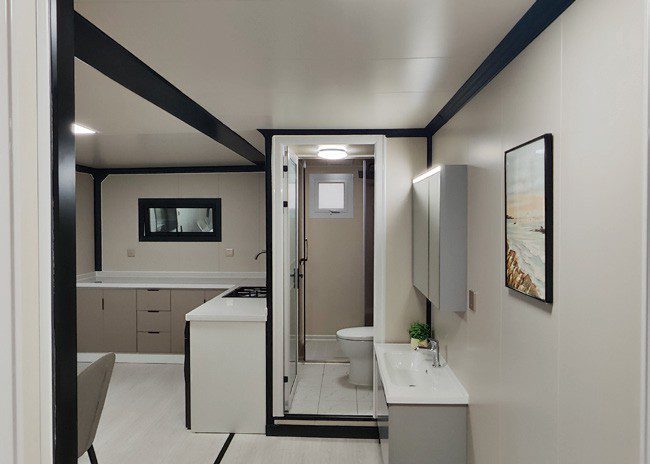A new way of living…
Of course, one of the most asked questions is, how will it be like to live in a container house. Know that you don’t have a big morgage is a great start. Once you paid off your container house, you only have toworry about your local yearly taxes if any depending where you install your new home.
Living in a container house offers a unique and often debated alternative lifestyle, attracting individuals seeking innovative and cost-effective ho solutions. A primary draw of this living arrangement is the potential to be free from the burden of a large, conventional mortgage, translating to significant long-term financial benefits for homeowners. Once the initial investment in your container home is completely settled, the main ongoing financial consideration generally centers around local yearly property taxes. It’s important to note that these tax rates can vary substantially based on the precise geographical location where you choose to establish your new, container-based residence. It’s the waty to the futur.
Living in style!
Living in a container house offers a unique and innovative alternative lifestyle that many people find both exciting and practical. Unlike conventional homes built from brick, wood, or concrete, container homes repurpose shipping containers—durable, modular steel structures originally designed for transporting goods. This repurposing not only minimizes construction time but also significantly reduces building waste, making it an eco-friendly ho option. For individuals and families seeking an affordable way to own a home, container houses present an attractive alternative because they generally require a lower upfront investment compared to traditional properties. This affordability helps people avoid the burden of a heavy, long-term mortgage, making homeownership more accessible and financially manageable.
Once you’ve covered the initial cost of your container home—which can vary depending on factors like size, design complexity, and location—your main ongoing expense typically narrows down to local annual property taxes. The amount of these taxes can differ widely based on the region, reflecting the property values and local tax rates, but this often represents a predictable and relatively low recurring cost. Additionally, container homes tend to be smaller and more energy-efficient than many traditional houses, which can lead to further savings in utility bills and maintenance expenses over time.
Beyond the financial benefits, embracing container living represents a conscious lifestyle choice that aligns with growing environmental awareness and the desire to reduce one’s carbon footprint. Container homes promote sustainability through recycling existing materials and often incorporate renewable energy systems, such as solar panels, and water-saving technologies. Their modular nature also allows for flexibility and customization, enabling inhabitants to create personalized living spaces that suit their needs and tastes without unnecessary excess. Furthermore, these homes can be easily expanded, relocated, or reconfigured, offering an adaptable way of living that suits modern, mobile lifestyles.
As urban areas face increasing ho shortages and rising costs, container homes provide a forward-thinking solution by offering compact, affordable, and sustainable dwellings that can fit into diverse environments—from rural land plots to dense urban settings. This innovative approach challenges traditional notions of homebuilding and community planning, encouraging a shift toward minimalist living that values quality, functionality, and environmental responsibility.
In summary, living in a container house is more than just a passing trend; it’s a smart and forward-looking step toward the future of ho. It combines financial practicality, environmental sustainability, and design flexibility, appealing to a wide range of people—from eco-conscious millennials and tiny house enthusiasts to retirees seeking simplicity and affordability. As awareness grows and technology advances, container homes are poised to play an increasingly important role in addressing global ho challenges while fostering a lifestyle that is both exciting and mindful.

![]()



Comments are closed